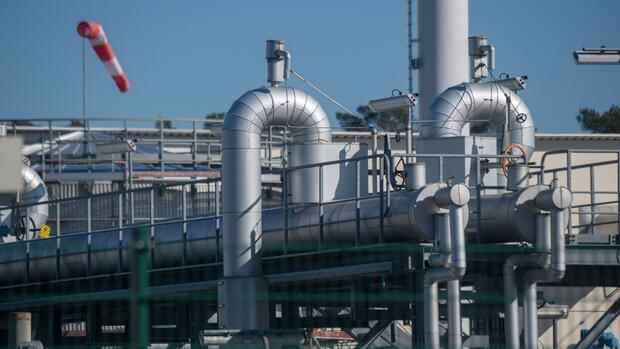Moscow/Berlin As announced, the Russian energy company Gazprom further reduced its gas deliveries to Germany through the Nord Stream Baltic Sea pipeline on Thursday night. As can be seen from the transport data published by the pipeline operator Nord Stream on the Internet, the gas volume fell from Wednesday evening. In the morning, the delivery volume – extrapolated to 24 hours – reached approximately the 40 percent of the technical capacity announced by Gazprom.
Federal Minister of Economics Robert Habeck called the situation serious, but it does not endanger the security of supply in Germany. The throttling of the gas volume coincides with the visit of Federal Chancellor Olaf Scholz to Kyiv.
Scholz arrived in Kyiv on Thursday morning together with French President Emmanuel Macron and Italian Prime Minister Mario Draghi. There they want to talk to President Volodymyr Zelensky, among other things, about further support for the country attacked by Russia.
Since 11 p.m. on Wednesday evening, Nord Stream data has shown a decrease in the gas delivery volume through the Baltic Sea pipeline. In the morning, at the beginning of the so-called gas day at 6 a.m., the hourly gas delivery volume via the Baltic Sea pipeline was around 2.6 million cubic meters (29 million kilowatt hours), from 8 a.m. to 11 a.m. according to the information, around 2.7 million cubic meters flowed hourly (30 million kilowatt hours).
Top jobs of the day
Find the best jobs now and
be notified by email.
The Russian energy giant Gazprom announced on Wednesday that it would again reduce gas delivery volumes through Nord Stream 1 to Germany. From Thursday night, only a maximum of 67 million cubic meters should be pumped through the pipeline every day. The state-owned company once again justified the step with delays in repair work.
Habeck calls for energy saving
Gazprom had already announced on Tuesday that it would reduce the previously planned daily volume by around 40 percent from 167 million to 100 million cubic meters of gas per day and pointed to delays in the repair of gas compressors. The energy technology group Siemens Energy then announced that a gas turbine overhauled in Canada could not currently be returned from Montréal due to the Russian sanctions. The recent reduction to 67 million cubic meters means a throttling of around 60 percent within two days.
The Federal Government considers the gas supply to continue to be guaranteed despite the renewed reduction in delivery volume. “Currently, the quantities can be procured on the market, albeit at high prices. It is currently still being saved,” said a spokeswoman for the Ministry of Economics on Thursday on request. “The security of supply is guaranteed.” However, the ministry is observing things very closely and is in close contact with the relevant actors about the crisis structures.
>>Read here: “Crisis such as Germany has never experienced”: Up to half a trillion euros in damage from the energy embargo
Economics Minister Habeck called again for energy saving because of the decline. In a video distributed on Twitter on Wednesday evening, the Green politician thanked the population and companies for their efforts so far. At the same time, Habeck appealed with a view to saving energy: “Now is the time to do that. Every kilowatt hour helps in this situation.”
Habeck warned: “We have to be vigilant. We have to keep working with concentration. Above all, we must not allow ourselves to be divided. Because that’s what Putin intends to do.” Contrary to Gazprom’s statement that the reason for the throttling are delays in repair work, Habeck suspects a political decision behind it.
The Federal Network Agency also called Moscow’s approach “technically unjustifiable”. The fact that Gazprom is now reducing its deliveries through Nord Stream 1 to around 40 percent is a warning signal from the point of view of the President of the Federal Network Agency, Klaus Müller. “Unfortunately, Russia is fueling uncertainty and driving up gas prices,” he told the “Rheinische Post” (Thursday).
If Gazprom only delivers 40 percent through Nord Stream 1 for weeks, Germany will have a problem, said Müller: “That would significantly worsen our situation. We might be able to endure that over the summer, because the heating season is over. However, we now have to fill the storage tanks to survive the winter – also with Russian gas.”
Since the beginning of the Russian war of aggression in Ukraine at the end of February, the supply of gas to Europe from Russia has been considered endangered. Since then, Germany and other European countries have been trying to reduce their dependence on Russian gas by purchasing more gas from other countries.
Poland, Bulgaria, Finland, the Netherlands and Denmark have already stopped receiving gas from Russia. At the end of March, Kremlin chief Vladimir Putin ordered a new payment system in response to Western sanctions in the wake of Russia’s war of aggression against Ukraine.
>>Read here: Russia’s revenge: a possible gas supply stop is Europe not prepared
The procedure stipulates that customers open a so-called K-account with the state-owned Russian Gazprombank. There they can still pay their bills in euros or dollars, the bank converts the money into rubles and transfers it to Gazprom. However, Poland, Bulgaria, Finland, the Netherlands and Denmark refused to switch to the new scheme.
For Germany, Nord Stream 1 is the main supply pipeline with Russian gas. The Yamal-Europe line, which runs through Poland, had previously not been filled. Gazprom had already throttled transit via Ukraine in mid-May.
According to data from the state gas network operator, only slightly less than 40 percent of the contractually planned 109 million cubic meters of natural gas will flow west on Thursday. Energy prices have increased as a result of the previous restrictions, among other things, because less gas flows from Russia to Europe overall.
More: There are no pipelines, LNG projects are stagnating: why Russia cannot simply divert its gas to Asia
